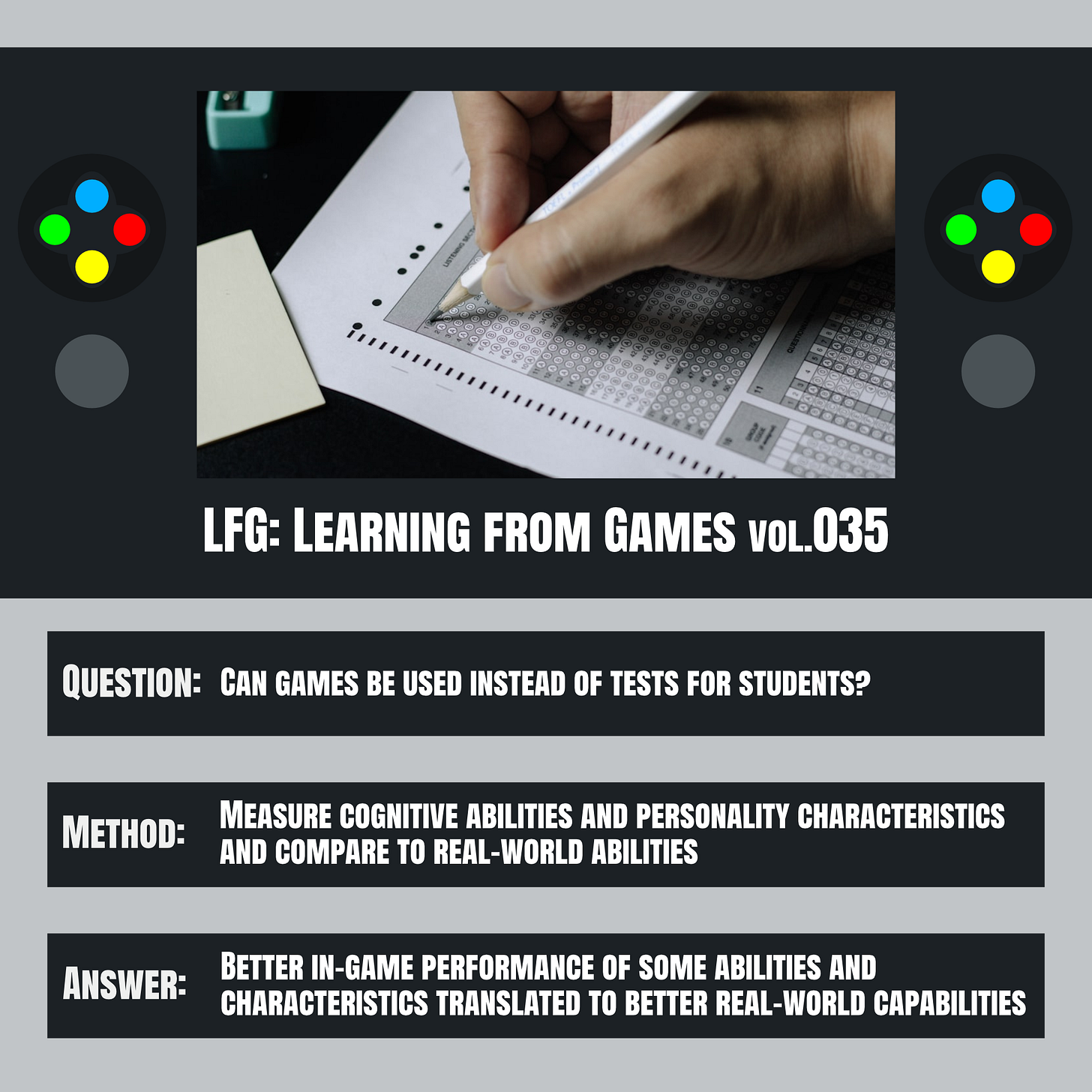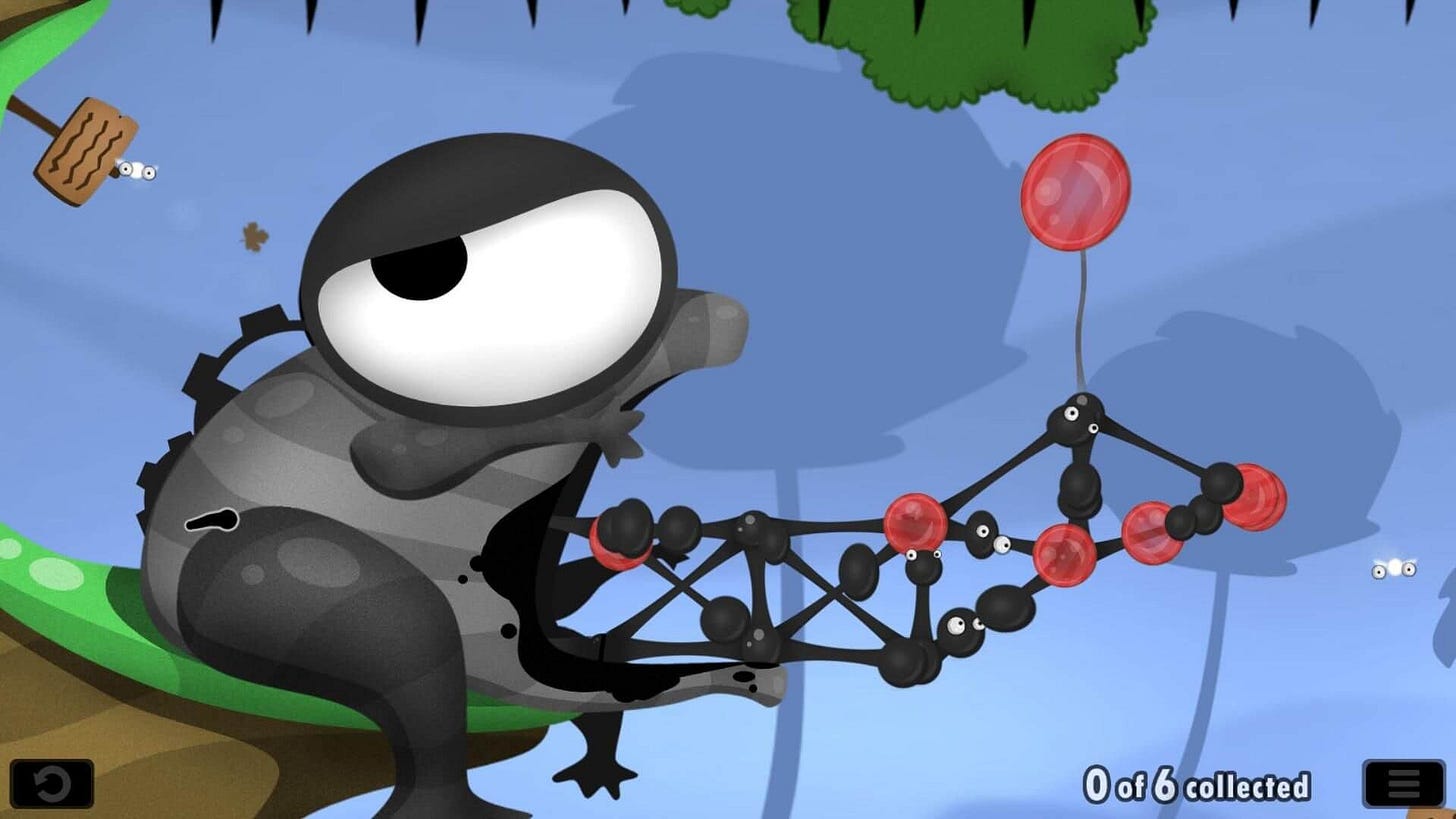Can games replace traditional tests?
A less stressful way to take exams
LFG: Learning from Games is a series dedicated to making the complex world of video game research just a little easier to understand. I post one about 2-3 times a month in between my Science Shorts and Coming Soon series. LFG #35 is about the potential for games to replace traditional tests.
Hello JOMT Reader!
I used to doze off during my tests back in school. This was because my body handled stress and anxiety of testing by falling asleep. As you can imagine, all that did was cause even more stress and anxiety because I had even less time to complete the test. It was a vicious cycle. I’m sure I drooled on more than one exam paper and distinctly remember being rudely awakened by a flying eraser launched by a thoughtful friend.
Why aren’t there other ways of testing? Something a little less stressful? Something with a bit more emphasis on the thought process to an answer?
It took a while but enter video game-based tests. Most of us can agree that games don’t feel like a test. So it doesn’t cause the same type of stress that traditional tests do. That fact alone can increase a person’s motivation to complete a test, especially for someone like me that handed in soggy exam papers.
Scoring is much more consistent in games. You didn’t have to worry whether the short paragraph you wrote would be subject to the whims of your teacher. A score is a score in games.
Finally, there’s a lot of measurable things you can do in a game before you get to the final answer. Some traditional exams will ask you to show your work, which helps examiners see how you solve a problem. But you can’t “show your work” for some types of questions. Being able to track your in-game behaviours leading up to a final answer is a great way to show your work.
Despite these advantages, there aren’t many studies on video game-based tests. So a team of researchers asked: can performance in video games be tied to real-world performance in students studying to become surgeons?
📏What can be measured using games?
In short, a lot. But it has to be intentional. For this study, the researchers looked at 14 different characteristics that are important for surgical students.
Planning: The ability to work out and implement the steps required to solve a problem.
Problem-solving: The ability to work through unexpected challenges.
Ingenuity: The ability to experiment and find unique and creative solutions.
Goal-orientation: The ability to stay focused on achieving a goal.
Self-reflection: The ability to learn from failure and adapt.
Endurance: The ability to invest effort for a long time.
Analytical thinking: The ability to collect, organize, and apply the information needed to solve a problem.
Learning: The ability to recognize a pattern and apply them in relevant situations.
Flexibility: The ability to adapt to changing situations.
Concentration: The ability to stay focused even during boring, repetitive tasks.
Conformity: The ability and willingness to follow instructions.
Multitasking: The ability to split attention between two tasks without a drop in performance.
Working memory: The short-term ability to store and retrieve information.
Precision: The ability to perform a task accurately.
🎮What games were used?
Three games were developed and used to measure the 14 characteristics above. They were:
Dotto: In this game, players have to build a structure by manipulating balls and sticks to reach a goal. Some of the situations require a trial-and-error approach as the problems are not always clearly defined.
Characteristics measured by the game: planning, problem-solving, ingenuity, goal orientation, self-reflection, endurance, precisionCurioCity: In this game, players must make their way through a dynamic and changing maze.
Characteristics measured by the game: analytical thinking, learning, flexibility, concentration, conformity, precisionMultiTask: In this game, players are asked to perform two simultaneous tasks.
Characteristics measured by the game: multitasking, working memory, precision
Could commercially available games be used for this purpose? Probably! Dotto sounds a lot like World of Goo and World of Goo 2. CurioCity sounds a lot like the labyrinths of Maze Runner. And MultiTask sounds a lot like a single player version of Overcooked. If there was a way to get more data out of these games, maybe they could also be used for research?
🧪Are games useful for testing?
Yes!
Not all of the measured characteristics mapped to real-world performance. But planning, problem-solving, analytical thinking, learning, flexibility, and precision metrics in the game predicted real-world performance test scores.
Previous experience with gaming didn’t give gamers a big advantage in these scores, meaning that video games can be useful in predicting real-world performance.
What’s most interesting about this study is that none of the characteristics were technical skills required by surgeons. They were either cognitive abilities or personality characteristics.
The researchers proposed using game-based testing to screen appropriate candidates for further training in the surgical residency program. I don’t agree with this particular use — I’m a firm believer in being able to train and practice your way into almost anything — and the idea to let a test govern what you want to do sounds like an express ticket to a dystopian future.
But being able to assess where you are with game-based testing and getting feedback about what to improve in a mostly relaxed environment like gaming sounds like a fantastic alternative to traditional testing. Maybe I wouldn’t have drooled all over my test if I had been playing a game!
‼️Final remarks
We do need to be mindful about how, when, and where we introduce games, as too much can also cause issues. In particular, using game-based tests to screen people and students for certain occupations and careers raises a lot of alarms. But I think there is a lot of benefits to using it as a tool for continuous improvement!
If you want to read the article that inspired this post, you can read it here for free: https://mededu.jmir.org/2025/1/e72264
If you liked what you read, please consider giving this post a like and sharing it with your community!






I'm not sure about this idea. It's just my bias, but tests are meant to be daunting, uncertain, and uncomfortable. I don't want a surgeon who only performs well because they're having a good day. I want one that can also handle stress, anxiety, and doubt, yet have the experience to do a good job anyway.
This would be cool. Let take the main analytics and find a good game candidate for each :)
Planning - I'd go for Oxygen Not Included - for this colony sim demands meticulous planning.
Problem-Solving - Baba is You - as a puzzle game that really makes you thing outside the box.
Analytical Thinking - Inscryption - analyse patterns, decode mysteries, logical deduction... all while under a horror tension.
Learning - Stardew Valley - farming, crafting, social mechanics, etc. a lot to learn and possibility to show how you use what you've learned.
Flexibility - Hades - adapt builds, strategies and playstyles. Roguelikes work perfectly here.
Precision - Celeste - as it requires precise jumps, accuracy and timing, while perseverance is put to the test.
Cool to think about!